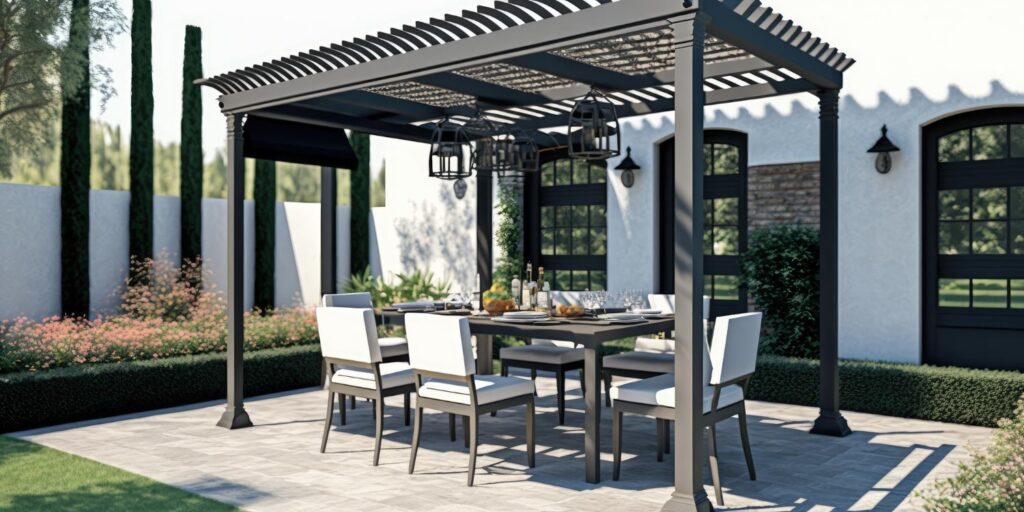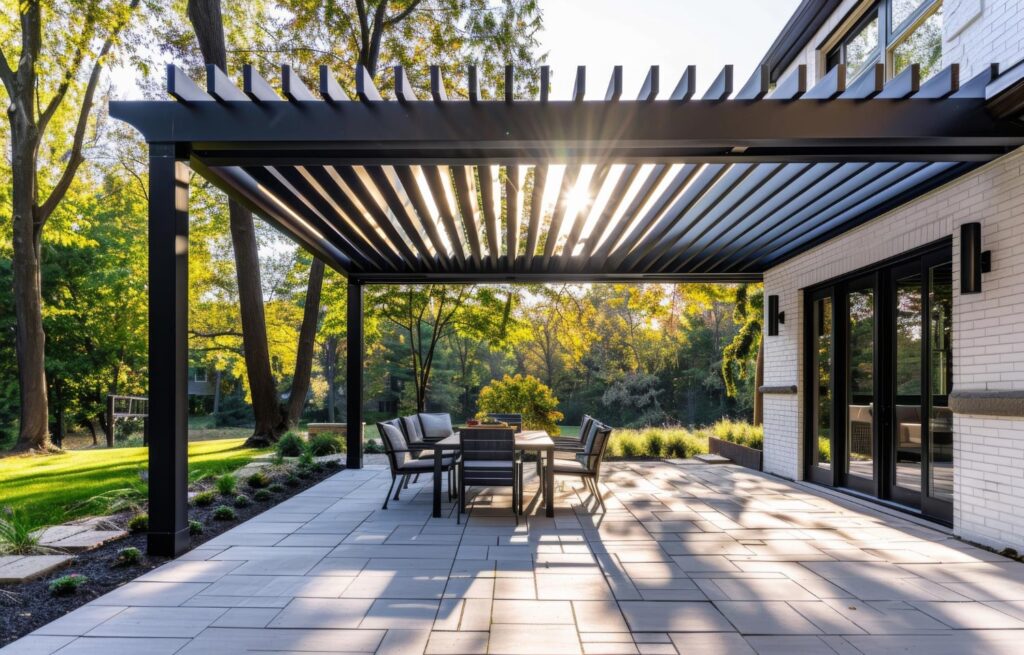What is the Best Pergola Material for your Home in Australia?
Our Blog
Sunshine is a blessing in Australia, but that doesn’t mean you can’t enjoy your outdoor space year-round. Pergolas offer the perfect solution, creating a shaded haven for entertaining or relaxing. But with so many materials to choose from, how do you pick the perfect one?
The ideal pergola material for your Australian home depends on a few key factors:
- climate
- desired aesthetics
- budget
From the classic beauty of timber to the ultra-durable metal, each material offers unique advantages and considerations.
Let’s explore the top contenders to help you find the pergola material that best complements your home and lifestyle.
Best Pergola Materials:
Wooden Pergolas
Timber pergolas offer a timeless charm that seamlessly blends with the natural Australian landscape. Crafted from eucalyptus, spotted gum, or ironbark, these beauties boast a warm aesthetic that complements various architectural styles. While requiring regular maintenance like staining or painting, timber pergolas are a popular choice for their affordability and ability to create a relaxed and inviting outdoor atmosphere.
Pros of Woode Pergolas
- Natural Beauty: Wooden pergolas offer a timeless and natural aesthetic that complements various architectural styles. The warm tones of the wood can create a relaxed and inviting outdoor atmosphere.

- Affordability: Compared to metal or concrete pergolas, wooden pergolas are generally a more affordable option. This makes them a good choice for budget-conscious homeowners.
- Versatility: Wooden pergolas can be stained or painted in a variety of colors to match your existing décor or create a specific look. They can also be customized in terms of size and design to fit your space perfectly.
Cons of Woode Pergolas
- Maintenance: Wooden pergolas require regular maintenance to keep them looking their best and to prevent them from rotting or warping. This includes staining or painting them every few years.
- Susceptibility to Elements: Wood is susceptible to moisture, rot, and insect damage. In harsh weather conditions, wooden pergolas may require more frequent maintenance or repairs.
- Fire Risk: Wood is a combustible material, so it is important to be aware of fire safety regulations when installing a wooden pergola.

Vinyl Pergolas
Vinyl pergolas offer a contemporary look with the advantage of minimal upkeep. These pergolas are constructed from a durable PVC material that comes in a variety of colors, allowing you to find a perfect match for your home’s exterior.
Pros of Vinyl Pergolas
- Low Maintenance: Unlike timber pergolas, vinyl requires minimal maintenance. An occasional cleaning with a hose is usually enough to keep it looking fresh.
- Low Maintenance: Unlike timber pergolas, vinyl requires minimal maintenance. An occasional cleaning with a hose is usually enough to keep it looking fresh.
- Durability: Vinyl pergolas are weather-resistant and won’t warp, crack, or rot like wood. They can withstand harsh Australian sun and rain without deteriorating.
- Versatility: Vinyl pergolas come in a variety of colors, giving you more design flexibility than traditional timber pergolas. You can choose a classic white, a modern charcoal, or something in between to complement your outdoor space.
Cons of Vinyl Pergolas
- Aesthetics: While vinyl pergolas offer a clean and modern look, they may not have the same natural warmth as timber pergolas.
- Heat Absorption: Darker colored vinyl can absorb more heat from the sun, making the area underneath feel warmer on hot days. Opting for lighter colors can help mitigate this.
- Limited Customization: Vinyl pergolas typically come in prefabricated designs, offering less customization compared to pergolas built with other materials.
Aluminium Pergolas
Aluminum pergolas are a popular choice for Australian homes due to their combination of strength, style, and low maintenance. Crafted from lightweight yet sturdy aluminum, these pergolas offer a sleek and modern aesthetic that complements various architectural styles.
Pros of Aluminium Pergolas
- Durability: Aluminium is incredibly resistant to rust, corrosion, and harsh weather conditions. You can expect your aluminum pergola to last for many years with minimal upkeep.

- Durability: Aluminium is incredibly resistant to rust, corrosion, and harsh weather conditions. You can expect your aluminum pergola to last for many years with minimal upkeep.
- Low Maintenance: Unlike timber pergolas, aluminum requires minimal maintenance. A simple cleaning with soap and water is usually enough to keep it looking its best.
- Lightweight: Aluminium is a lightweight material, making it easier to install compared to heavier options like concrete. This can also be an advantage if you’re considering a larger pergola design.
- Versatility: Aluminium pergolas can be painted in a variety of colors to match your existing décor or create a specific look. They also come in a range of styles, from classic to contemporary, to suit your taste.
Cons of Aluminium Pergolas
- Cost: Aluminium pergolas are generally more expensive than timber pergolas, but their lower maintenance requirements can offset this cost over time. Note: Metal pergolas, in general, can be more expensive than some other options.
- Heat Transfer: Metal can absorb and retain heat, so aluminum pergolas may feel warmer underneath on hot days. Adding shade sails or planting climbing vines can help mitigate this issue.
- Limited Insulation: Metal pergolas offer minimal insulation, so they may not be ideal for creating a year-round usable outdoor space.
How Canberra's Climate affects Your Choice for Pergola in Australia
Here’s what to consider regarding Canberra’s climate and weather for your pergola:
- Sun: Canberra gets plenty of sunshine year-round. A pergola with some type of roof (like slats, shade panels, or a climbing vine canopy) will provide welcome shade during hot summer days.
- Rain: While not excessive, Canberra does experience some rainfall throughout the year. An open roof pergola allows for water drainage, but you might consider a roof option if you want to use your pergola during rainy periods.
- Wind: Canberra can be windy, especially in spring. A sturdy pergola design with secure footings is important. Consider talking to your builder about wind load requirements in your area.
- Temperature Extremes: Canberra experiences hot summers and cold winters. Depending on how you plan to use your pergola, you might consider ventilation options (like adjustable slats) for hot days or installing heat lamps for occasional winter use.
Final Thoughts
In conclusion, building a pergola in Canberra adds beauty, functionality, and value to your backyard. With a wide range of materials, designs, and features to choose from, you can create a perfect outdoor space that reflects your style and needs. While the cost can vary depending on your choices for pergola in Canberra, you can expect a ballpark range of $2,000 to $12,000 for a basic pergola. Remember to consider Canberra’s climate – sun protection, rain drainage, wind load, and potentially even temperature control depending on your usage.
Ready to add a touch of magic to your Canberra backyard?
Don’t wait any longer! Rebel Roofing ACT is your one-stop shop for pergolas in Canberra. We offer expert advice, high-quality materials, and exceptional service to bring your dream pergola to life. Contact Rebel Roofing ACT today for a free quote and start creating your outdoor oasis!
Frequently Asked Questions (FAQs)
Both pergolas and gazebos are outdoor structures that provide shade and lounging areas. However, pergolas have an open beam roof that allows sunlight and air to pass through, while gazebos typically have a solid roof and walls, offering more coverage from sun and rain.
Pergola kits come with pre-cut and pre-drilled materials, making them easier to assemble than building a pergola from scratch. However, some DIY experience and a good set of tools are recommended.
Popular pergola materials include:
- Cedar: Offers a beautiful natural look, but requires maintenance like staining or painting.
- Treated pine: Affordable and relatively low maintenance.
- Vinyl: Low maintenance and comes in various colors.
- Metal: Very durable and weather-resistant, but can be more expensive.
Cedar pergolas offer a warm aesthetic appeal, naturally repel insects, and resist rot and decay.
Pergola prices can vary depending on size, material, design complexity, and additional features. In general, expect a range of $2,000 to $12,000 for a basic pergola.
The best way to get an accurate pergola quote is to contact local pergola builders or companies like Rebel Roofing ACT. They can assess your needs and provide a quote based on your desired size, material, and features.
Pergolas with solid or louvered roofs offer some protection from UV rays. Open roof pergolas provide partial shade, but sunscreen is recommended for prolonged sun exposure.
A louvered pergola has a roof with adjustable slats that can be opened or closed to control the amount of sunlight and shade.
Pergolas can have various roof options, including:
- Open roof (most affordable, basic shade)
- Gabled roof (provides headroom, water runoff)
- Polycarbonate roof (light filtering, rain protection)
- Louvered roof (adjustable shade control)
- Insulated roof panels (maximum protection from elements)
utdoor pergolas offer numerous benefits, including:
- Providing shade and creating a cool outdoor space
- Adding beauty and style to your backyard
- Supporting climbing plants and vines
- Creating an inviting outdoor entertainment area
